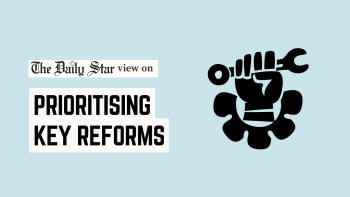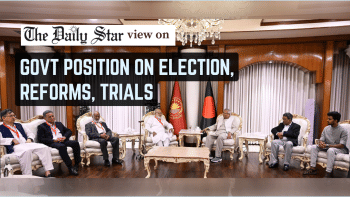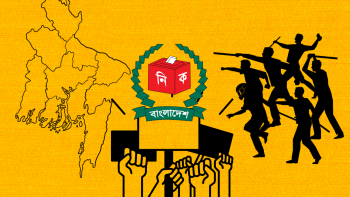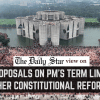The reform drive must continue apace

It is reassuring to see the conclusion of the first round of talks between the National Consensus Commission (NCC) and political parties over reforms meant to lay the groundwork for a more accountable and transparent system of governance. In a country where political deadlock is more common than consensus, the achievement of common ground across a wide spectrum of issues marks a departure worth noting. The first round—which covered 166 key reform proposals over 45 sessions—produced agreements in several major areas, but also disagreements in others, setting the stage for the second round of talks expected to begin within days. While this process goes on, the NCC plans to engage the Bangladesh Bureau of Statistics to conduct a survey to gather public feedback on key proposals and finalise a "National Charter" based on broader consensus by July.
Thanks to the structured and publicly accessible manner in which the discussions were held, we now know the areas where the parties agreed, partially agreed, or disagreed. For instance, all parties agreed to reinstate the non-partisan caretaker government system to oversee elections, but disputes remain over its formation, tenure, and the mechanism for appointing a chief adviser. Similarly, while there is support for a bicameral legislature and empowering the opposition through the deputy speaker's post, disagreements remain over how members of the proposed upper house should be elected. Another crucial sticking point is the proposal to limit the prime minister's authority—particularly preventing one from simultaneously holding the posts of PM, party chief, and leader of the House. Proposals to impose term limits on PM and reform the process of electing the president have also proven divisive. Sharp divisions remain over the proposed formation of a National Constitutional Council to oversee key appointments and uphold legal standards.
That said, the areas of consensus are significant in their own right. Parties have collectively endorsed vital judicial reforms, including the creation of a separate Supreme Court Secretariat, curbing executive control over judicial appointments, and introducing accountability mechanisms to discipline judges exhibiting political bias. There is also agreement on placing key parliamentary committees—such as those on public accounts, estimates, and government undertakings—under opposition control. On anti-corruption, all parties supported granting the Anti-Corruption Commission constitutional status, and ensuring its independence and accountability. Electoral reforms have also made notable progress. In public administration, there is strong support for automating public services, revising outdated laws such as the Official Secrets Act, and modernising the Right to Information Act.
While full consensus on all unresolved issues is unlikely, as Prof Ali Riaz, co-chair of the NCC, has also acknowledged, we hope that political parties will engage sincerely in the remaining talks. Otherwise, the push for critical reforms may stall. At the same time, we must keep in mind the challenges of implementing reforms. The protests following the dissolution of the National Board of Revenue and the introduction of the Public Service (Amendment) Ordinance, 2025 show that real change will depend on our collective resolve to follow through despite the resistance these changes may provoke. All stakeholders must, therefore, rise above partisan or group interests, and act from a place of national responsibility.


 For all latest news, follow The Daily Star's Google News channel.
For all latest news, follow The Daily Star's Google News channel. 










Comments